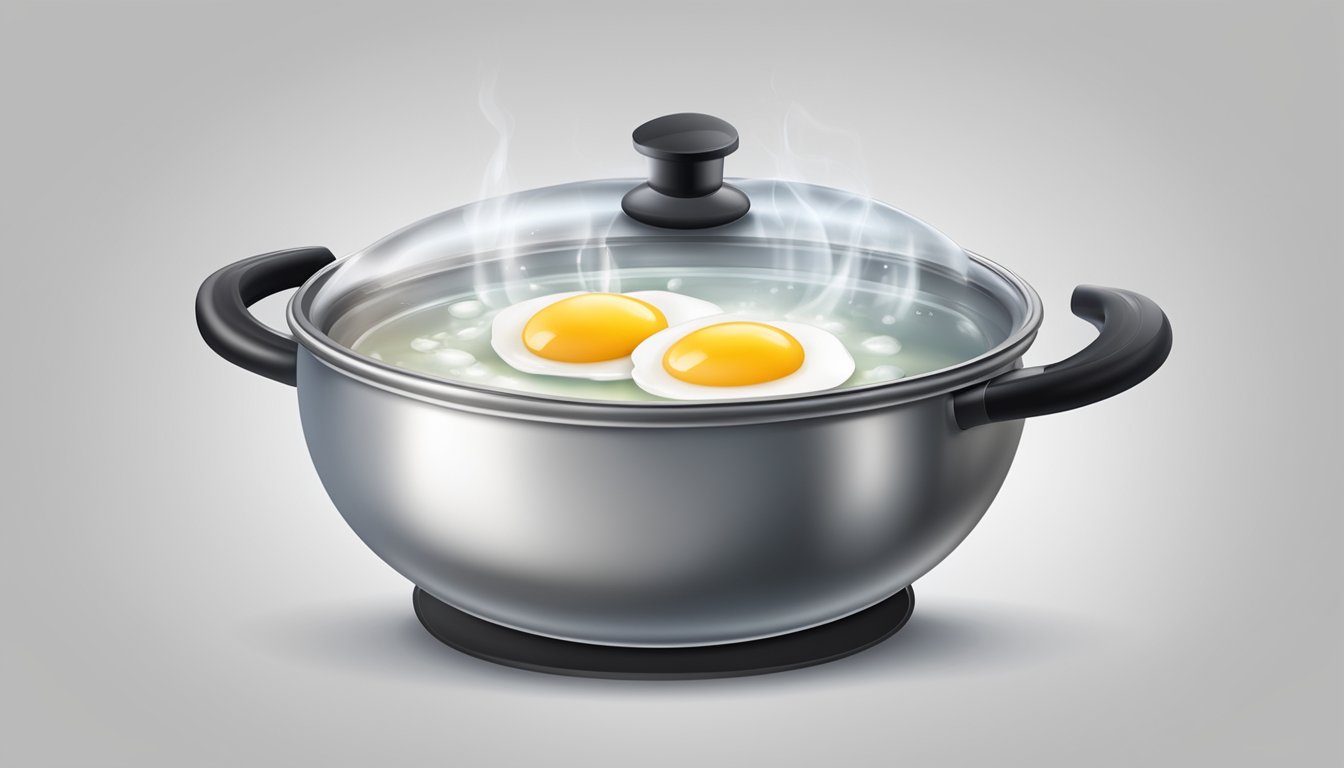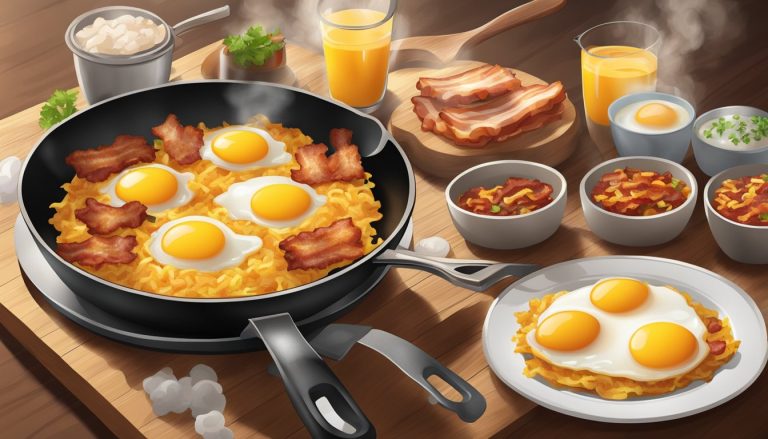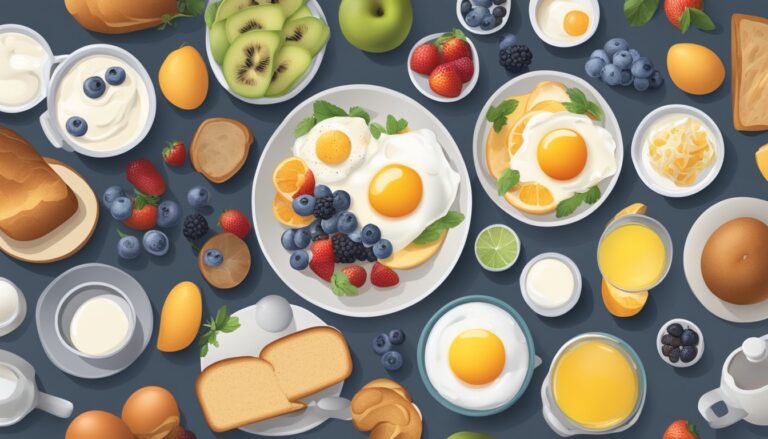Hard-boiled eggs are a versatile and nutritious staple in many kitchens. They can be enjoyed on their own, added to salads, or used in various recipes. Despite their simplicity, achieving the perfect hard-boiled egg can be challenging for some home cooks.
To make perfect hard-boiled eggs every time, place eggs in a saucepan, cover with cold water, bring to a simmer, then remove from heat and let stand covered for 17 minutes. This method ensures consistently cooked eggs with firm whites and creamy yolks, without the dreaded green ring that can form around overcooked yolks.
Proper technique is key to avoiding common issues like difficult-to-peel shells or rubbery egg whites. By following a few simple steps and paying attention to timing, anyone can master the art of hard-boiling eggs. The result is a protein-packed snack or ingredient that’s ready to elevate any dish.
The Basics of Boiling Eggs
Mastering the art of boiling eggs starts with understanding a few key principles. The right eggs, proper storage, and careful preparation set the foundation for perfect results.
Choosing the Right Eggs
Selecting the appropriate eggs is crucial for boiling success. Opt for eggs that are a few days to a week old. These eggs have slightly larger air pockets, making them easier to peel after boiling.
Look for eggs with intact, clean shells. Avoid eggs with cracks or visible imperfections. Size matters too – medium to large eggs are ideal for most boiling methods.
For consistent results, choose eggs from the same carton. This ensures they’re of similar age and will cook uniformly.
Egg Storage and Freshness
Proper storage is key to maintaining egg quality. Keep eggs in their original carton in the main body of the refrigerator, not in the door.
Store eggs with the pointed end down to keep the yolk centered. This position also helps preserve freshness by keeping the air pocket at the top.
Check the expiration date on the carton. Fresh eggs typically last 3-5 weeks in the refrigerator. To test freshness, place an egg in a bowl of water. Fresh eggs sink, while older eggs float.
Preparing Eggs for Boiling
Before boiling, remove eggs from the refrigerator and let them sit at room temperature for 10-15 minutes. This reduces the risk of cracking when placed in hot water.
Gently wash the eggs under cool running water to remove any dirt or debris. This step is especially important if you plan to eat the eggs with the shell on, like for Easter eggs.
If you’re concerned about cracking, use a pushpin to make a tiny hole in the large end of each egg. This allows air to escape during cooking, reducing the chance of shells breaking.
Cooking Techniques
Mastering the art of hard-boiled eggs involves precise techniques and timing. Different methods can yield perfectly cooked eggs with firm whites and creamy yolks.
Boiling Eggs Step-by-Step
Place eggs in a single layer in a saucepan. Cover with cold water, about 1 inch above the eggs. Bring to a rolling boil over high heat.
Once boiling, remove the pan from heat. Cover and let stand for 10-12 minutes, depending on desired doneness.
Drain the hot water and immediately transfer eggs to an ice bath. This stops the cooking process and prevents overcooking.
After 5 minutes in the ice bath, eggs can be peeled or stored in the refrigerator.
Alternative Methods
Steaming is an effective alternative to boiling. Place eggs in a steamer basket over 1 inch of water. Bring water to a boil, cover, and steam for 12-14 minutes.
Pressure cookers offer a quick option. Add 1 cup of water and place eggs on the trivet. Cook on high pressure for 5 minutes, followed by a quick release.
Air fryers can also cook hard-boiled eggs. Preheat to 250°F (121°C). Cook eggs for 16 minutes, then transfer to an ice bath.
Adjusting Cooking Time
Egg size affects cooking time. Large eggs typically require 10-12 minutes, while medium eggs need 9-11 minutes.
For soft-boiled eggs with runny yolks, reduce standing time to 6-7 minutes.
Altitude can impact cooking times. At higher elevations, add 1-2 minutes to compensate for lower boiling temperatures.
Fresh eggs may need slightly longer cooking times compared to older eggs.
Test one egg first to determine the ideal time for your preferences and equipment.
Egg Cooling and Peeling
Properly cooling and peeling hard-boiled eggs is crucial for achieving perfect results. The methods you use can significantly impact the ease of peeling and the final texture of your eggs.
The Ice Water Bath Method
Immediately after boiling, transfer the eggs to an ice water bath. This stops the cooking process and prevents overcooking. Fill a large bowl with ice and cold water. Gently lower the eggs into the bath using a slotted spoon.
Leave the eggs in the ice bath for 5-10 minutes. This rapid cooling causes the egg to contract inside the shell, making it easier to peel. If needed, refill the bowl with cold water to maintain the low temperature.
For best results, peel the eggs once they’re cool enough to handle. The ice bath method is highly effective for producing easy-to-peel eggs with tender whites.
Peeling Techniques
Start peeling at the wider end of the egg, where an air pocket usually forms. Gently tap the egg on a hard surface to create cracks all over the shell. Roll the egg between your hands to loosen the shell further.
Under running cold water, begin peeling from the wider end. The water helps separate the shell from the egg white. For stubborn shells, try peeling under a thin stream of water.
If you encounter difficulty, refrigerate the eggs for a few hours or overnight. This can make peeling easier, as the eggs continue to contract inside the shell.
Storing Peeled Eggs
Once peeled, rinse the eggs to remove any shell fragments. Pat them dry with a clean paper towel. Store peeled eggs in an airtight container in the refrigerator.
For maximum freshness, place a damp paper towel in the container to maintain moisture. Properly stored, peeled hard-boiled eggs can last up to one week in the refrigerator.
Use peeled eggs within 2-3 days for the best quality. Avoid leaving peeled eggs at room temperature for more than 2 hours to prevent bacterial growth.
Hard Boiled Eggs in Recipes
Hard boiled eggs are versatile ingredients that enhance many dishes. They add protein, texture, and flavor to salads, main courses, and holiday favorites.
Salads and Appetizers
Egg salad is a classic use for hard boiled eggs. Mix chopped eggs with mayonnaise, mustard, and seasonings for a creamy sandwich filling or dip. Deviled eggs are popular appetizers made by halving eggs and filling them with a seasoned yolk mixture.
Cobb salad features rows of chopped hard boiled eggs, bacon, avocado, and blue cheese over lettuce. For a healthier option, add sliced eggs to a spinach salad with mushrooms and red onion.
Potato salad often incorporates diced hard boiled eggs. They complement the potatoes and add richness to the dish. Some recipes call for mashing the egg yolks into the dressing for extra creaminess.
Main Courses and Snacks
Avocado toast topped with sliced hard boiled eggs makes a satisfying breakfast or lunch. Sprinkle with salt, pepper, and herbs for added flavor. Egg salad sandwiches are quick, protein-packed meals perfect for picnics or busy days.
Hard boiled eggs can be added to grain bowls, ramen, or curry dishes for extra protein. They’re also common in some variations of meatloaf, adding moisture and binding ingredients together.
As a simple snack, halved hard boiled eggs can be seasoned with salt and pepper or topped with hot sauce for a quick protein boost between meals.
Holiday Specialties
Easter eggs are a beloved tradition. Hard boiled eggs are dyed in vibrant colors and used for egg hunts or as festive decorations. After the holiday, these can be peeled and used in various recipes.
For Passover, hard boiled eggs are often included on the Seder plate as a symbol of sacrifice and the cycle of life. They may also be served in salt water as part of the meal.
In some cultures, hard boiled eggs are given as gifts during spring festivals to symbolize new life and fertility. These can be elaborately decorated or simply enjoyed as part of holiday meals.
Troubleshooting Common Issues
Mastering hard-boiled eggs can be tricky, but knowing how to address common problems ensures perfect results every time. These tips will help you achieve ideal texture and appearance.
Preventing the Green Ring
The dreaded green ring around egg yolks is caused by a reaction between iron and sulfur when eggs are overcooked. To avoid this:
- Use fresh eggs for best results
- Lower eggs gently into already boiling water
- Set a timer and don’t exceed recommended cooking times
- Immediately transfer eggs to an ice bath after cooking
These steps prevent overcooking and stop the cooking process quickly, preserving the bright yellow yolk color.
Ensuring Firm Whites and Creamy Yolks
Achieving the perfect balance of firm whites and creamy yolks requires precise timing:
- For medium-boiled eggs with slightly soft centers, cook for 7-8 minutes
- For fully set but creamy yolks, aim for 9-10 minutes
- Use eggs at room temperature for more even cooking
Adjust cooking times based on egg size. Larger eggs may need an extra minute.
Handling Overcooked Eggs
If you’ve accidentally overcooked your eggs, try these solutions:
- Peel the eggs under cool running water to help separate the shell
- Use older eggs, as they tend to peel more easily
- If the yolk is dry, mash it with a bit of mayo or mustard for egg salad
- Slice overcooked eggs for salads or sandwiches to mask any texture issues
While prevention is ideal, these tips can help salvage overcooked eggs and minimize waste.
Nutritional Value and Health Benefits

Hard-boiled eggs are a nutritious and versatile food. They provide essential nutrients and can be easily incorporated into various meals and snacks.
Egg Nutrition Facts
A large hard-boiled egg contains approximately 78 calories, 6 grams of protein, and 5 grams of fat. It is rich in vitamins and minerals, including vitamin A, vitamin B12, vitamin D, folate, selenium, and zinc. Eggs are an excellent source of choline, which is crucial for brain health and metabolism.
The protein in eggs is considered complete, containing all nine essential amino acids. This makes hard-boiled eggs an ideal choice for muscle building and repair.
Hard-boiled eggs are low in carbohydrates, with less than 1 gram per egg. This makes them suitable for low-carb and ketogenic diets.
Incorporating Eggs into a Healthy Diet
Hard-boiled eggs make an excellent protein-packed snack. They can be eaten alone or added to salads, sandwiches, and wraps for a nutrient boost.
For weight management, hard-boiled eggs can help increase feelings of fullness due to their high protein content. This may lead to reduced calorie intake throughout the day.
Consuming eggs regularly can support eye health due to their lutein and zeaxanthin content. These antioxidants help protect against age-related macular degeneration.
Athletes and fitness enthusiasts often include hard-boiled eggs in their diets for their protein content and easy portability. They make an ideal pre or post-workout snack.
Efficient Meal Prep and Storage
Hard-boiled eggs make an excellent protein-rich snack or meal component. Proper preparation and storage techniques ensure you always have a supply of ready-to-eat eggs on hand.
Batch Cooking and Peeling
Cook a large batch of eggs at once to save time and energy. Use a large pot that can accommodate multiple layers of eggs. Follow the foolproof method of bringing water to a boil, then removing from heat and letting eggs sit covered for 10-12 minutes.
Once cooled, peel eggs immediately for easier removal. Gently tap each egg on a hard surface and roll to create cracks all over. Start peeling from the wider end where the air pocket is located.
Store peeled eggs in an airtight container with a damp paper towel to maintain moisture. This method yields easy-to-peel eggs that stay fresh for up to 5 days in the refrigerator.
Long-Term Egg Storage
For longer storage, keep hard-boiled eggs in their shells. The shell acts as a protective barrier, extending shelf life. Place unpeeled eggs in their original carton or an egg holder.
Label the container with the boiling date to track freshness. Properly stored, unpeeled hard-boiled eggs can last up to 1 week in the refrigerator.
Avoid freezing hard-boiled eggs, as it alters their texture. If planning to use eggs in recipes, consider freezing raw eggs instead.
For food safety, keep hard-boiled eggs refrigerated at 40°F (4°C) or below. Do not leave them at room temperature for more than 2 hours.




